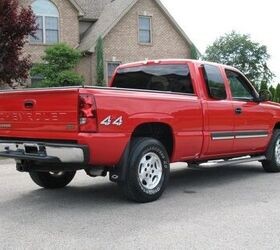In 2001, General Motors (GM) invested $64 million in its Fort Wayne plant to produce the Pro-Tec composite truck bed, a revolutionary all-composite pickup bed designed for the Chevrolet Silverado 1500. This marked a significant leap forward in truck bed technology, offering advantages like rust and dent resistance, lighter weight (50 lbs less than steel), and a built-in bedliner. This innovation promised to redefine the pickup truck market. But what happened to this seemingly game-changing product?
The Pro-Tec Bed: A Promising Start That Fizzled
The Pro-tec Bed was initially offered as an $850 option, exclusively available on short-bed Silverado models. Despite the clear benefits of composite construction—durability, weight reduction, and integrated bedliner—sales fell drastically short of GM’s projected 50,000 units per year. In reality, only about 5,000 Pro-Tec equipped Silverados were sold annually. This dramatic miscalculation led to the discontinuation of the Pro-Tec bed after just two model years.
 The Pro-Tec composite bed on a Chevrolet Silverado
The Pro-Tec composite bed on a Chevrolet Silverado
Why Did the Pro-Tec Bed Fail? A Look at Potential Reasons
Several factors contributed to the Pro-Tec bed’s demise. One key issue was dealer adoption. Dealers, the crucial link between manufacturer and consumer, were hesitant to stock trucks with the Pro-Tec option. This reluctance stemmed from various factors, including potentially lower profit margins compared to aftermarket bedliners and a general lack of understanding and promotion of the product’s benefits. Dealers often made more profit installing a $225 aftermarket bed liner than selling a truck with the $850 factory option.
Furthermore, limiting the Pro-Tec bed to short-bed models restricted its appeal to a smaller segment of the truck market. Work trucks, often favored in long-bed configurations, missed out on the benefits of the composite design. The pricing strategy may have also played a role. Was an $850 premium too steep for a feature that wasn’t well understood or actively promoted?
The Legacy of the Pro-Tec Bed and the Future of Composite Beds
Despite its commercial failure, the Pro-Tec bed remains a notable example of innovation in the automotive industry. It paved the way for future composite bed designs, such as the one found in the current Toyota Tacoma. While the Tacoma’s composite bed has faced its own set of challenges, it highlights the continued interest in exploring alternative materials for truck bed construction. The Pro-Tec story serves as a valuable lesson in the importance of market research, dealer engagement, and effective marketing in the success of any new product, especially in the competitive automotive landscape. The Pro-Tec bed, although a financial loss for GM, demonstrated the potential of composite materials in truck design and foreshadowed future advancements in the industry.

